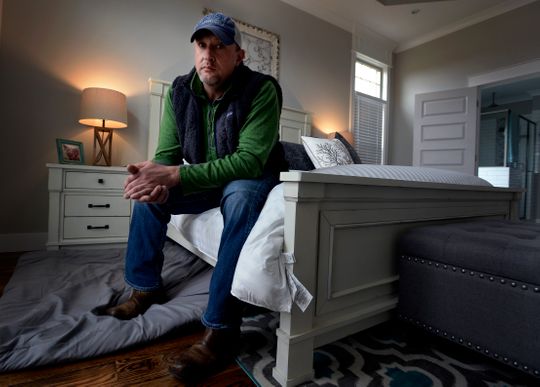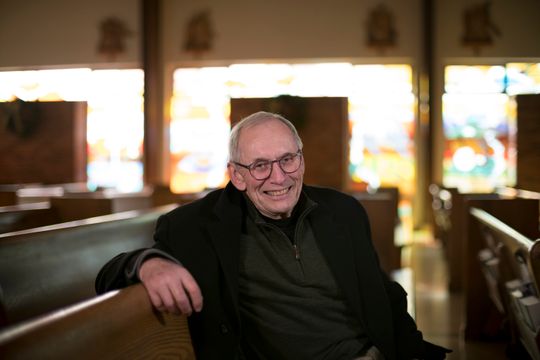Former Child Abuse Victims, Advocates Push Tennessee to End Its Expiration Date for Seeking Justice
By Holly Meyer
"I was mad for quite some time," the 42-year-old Walker said. "Then, I decided, you know, Iím not the only one out there facing this." So eventually, Walker, who is the president of WGNS radio in Murfreesboro, went to his state lawmakers and asked them to help him change the law by eliminating the statute of limitations on child felony sex abuse crimes in Tennessee. Statutes of limitations, intended to protect people from unfair prosecution, put an expiration date on pursuing legal action. Unbeknownst to Walker, it would not be long before other ordinary Tennesseans would start their own fights for the same change he wanted. But Walker's solo quest is what put him in front of panels of lawmakers last spring, recounting the sexual trauma he suffered as a child and the 20-plus years of drinking that followed. His testimony helped. The Tennessee General Assembly directed a state commission to study the matter and report back. "Iím glad that I was able to give words to hopefully make a difference," Walker said in a recent interview. In its report approved in December, the Tennessee Advisory Commission on Intergovernmental Relations recommended the state eliminate the statute of limitations on Class A and B felony child sex abuse crimes and consider extending or eliminating it for others. So far, lawmakers have introduced at least four bills to address the statute of limitations in child sex abuse cases. Rep. Mike Sparks, R-Smyrna, is sponsoring one such bill that would change it on Class A and B felony child sex abuse crimes. Currently, the statute of limitations for these types of crimes is either 15 or 25 years after a victim turns 18, the report says. Tennessee did eliminate it for the most serious offenses in 2014, but the authorities must be notified within three years of the crime. Stakeholders, like defense attorneys, raise concerns that eliminating the statute of limitations causes people to be prosecuted for crimes years after witness memories and evidence have eroded, the report says. But the commission found the nature of the crime compelling along with the fact that many child sex abuse victims come forward only late in life ó if at all. But state lawmakers have the final say on the matter. In the months before the commission made its recommendations, the issue found another receptive audience in East Tennessee. Catholic group pushes for legislative change A group of about 30 Catholic laypeople created a legislative wish-list that included tearing down the statutes of limitations for felony sex abuse crimes. Calvin Mattheis, calvin.mattheis@knoxnews.com Parishioners of St. Mary's Catholic Church and their priest gathered on an evening in August to discuss their concerns about the recent wave of the clergy sex abuse crisis unfurling in the U.S.
A damning Pennsylvania grand jury report had just come out detailing widespread priest abuse and church cover-up in six of the state's eight dioceses. "I remember as my wife and I sat in that meeting with this small group of people all kinds of things were going through my mind," church member Bob Benning said. He could identify with the grief, anger and frustration those around him shared. Many felt blindsided, having thought the Catholic Church had resolved its sex abuse crisis more than 15 years earlier, Benning said. It was in that meeting that Benning, 76, and several others in the room resolved to band together and do what they could to help victims inside and outside the church in Tennessee. "The next question that the group came to terms with was well, what are we going to do about it?" said Benning, who is not a victim himself. They tapped their fellow church member, Tennessee Lt. Gov. Randy McNally, R-Oak Ridge, for guidance. As they became informed about the issues, the group discovered Walker's testimony and the serendipitous timing of the commission's study, Benning said. The group of about 30 laypeople created a legislative wish list that included tearing down the statute of limitations for felony child sex abuse crimes and opening a temporary window for reviving expired claims in civil court. McNally has said he would support legislation for both. The Oak Ridge group is working to find others across the state who would be willing to rally behind proposed legislation. This is familiar work for Benning, who retired five years ago as the CEO of a psychiatric hospital. He also served with the Tennessee Coalition for Mental Health and Substance Abuse Services, giving him experience in advocating for legislation. That means Benning and the rest of the group know the legislative path ahead may be challenging. "There's no one there that is naive to think that thereís not going to be pushback from a lot of different entities because some of the legislation, if it goes forward, could have an impact on them," Benning said. "But our position is this is something that needs to be done."
|
.
Any original material on these pages is copyright © BishopAccountability.org 2004. Reproduce freely with attribution.

